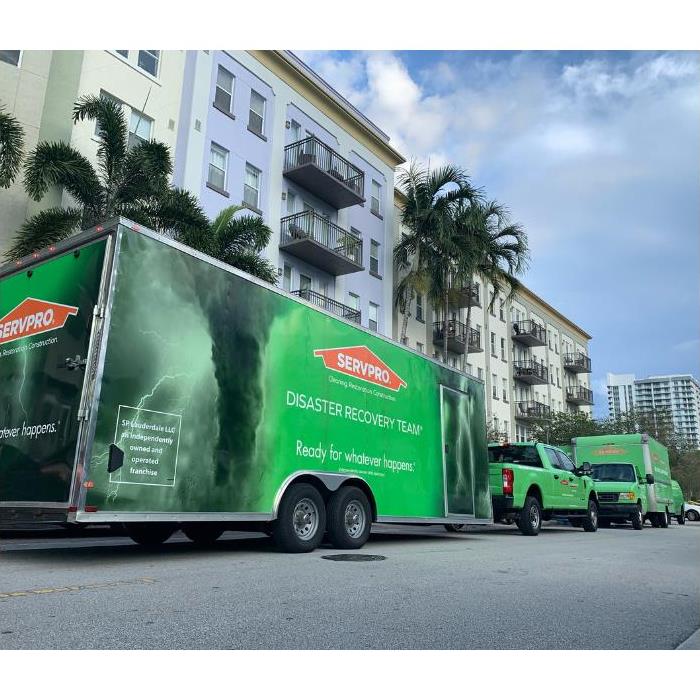Navigating the Storm: Essential Tips for Hurricane Season 2023 Preparedness
5/25/2023 (Permalink)
Why Hurricane Preparedness is Important
As we all enter another hurricane season here in southern Florida It is good to stay ready so you don’t have to get ready. Hurricanes are potent storms that can inflict extensive damage, causing flooding, power outages, and property destruction. Ensuring you are prepared for a hurricane can safeguard your family and property. Here are some reasons why hurricane preparedness is paramount:
- Unpredictability: Meteorologists can track a hurricane's path but can't predict its exact strength or potential damage. Despite useful resources like Hurricane Hunters, Mother Nature repeatedly shows us that we can never wholly foresee a storm's impact. Preparation for the worst-case scenario can help you weather the storm safely.
- Widespread Damage: Hurricanes can damage homes, businesses, and infrastructure, including power lines, roads, and bridges. Hurricane preparedness can help minimize property damage and expedite recovery post-storm.
- Potential Fatality: Beyond property damage, hurricanes can also cause loss of life. Being prepared for a hurricane can help you and your family stay safe during the storm and avoid perilous situations.
How to Prepare for a Hurricane
Preparing for a hurricane may seem daunting, but by taking some straightforward steps ahead of time, you can enhance your chances of full recovery. Here are some tips for hurricane preparedness:
- Assemble a disaster kit: This kit should include essentials like non-perishable food, water, a first-aid kit, flashlights, batteries, and a battery-powered radio. Do not forget necessary medications, important documents, and extra cash.
- Secure your home: There are steps you can take to fortify your home during a hurricane. These include installing hurricane shutters, reinforcing garage doors, and trimming trees and shrubs around your house.
- Document your property: It is crucial to take photos and videos of your property and belongings before a storm. This documentation can help prove incurred damage, which is useful for insurance purposes.
- Know your evacuation routes: If you live in a hurricane-prone area, familiarize yourself with your local evacuation routes. Plan where you would go if you need to evacuate and share this plan with your family.
- Stock up on supplies: As a hurricane approaches, it is prudent to stock up on essentials like food, water, and gas for your car. This ensures you have what you need if you cannot leave your home.
What to Do During a Storm
During a hurricane, staying informed and taking measures to protect yourself and your family are crucial. Here are some tips:
- Stay indoors: If you are home when a hurricane hits, stay inside and away from windows and doors. If you are in a low-lying area, move to higher ground.
- Heed local authorities: Tune into local news and follow the directives of local authorities. If you are told to evacuate, do so immediately.
- Turn off utilities: Turn off your electricity, gas, and water before the hurricane strikes to lessen the risk of electrical fires, gas leaks, and flooding.
- Avoid floodwaters: Never drive or walk through floodwaters—they can be incredibly dangerous. The IICRC (Institute of Inspection Cleaning and Restoration Certification) labels rising water from a hurricane as "Category 3 water"—grossly contaminated water that can pose severe health risks.
- Prepare for power outages: Hurricanes can cause prolonged power outages. Have a backup generator or alternative power sources ready.
By adhering to these tips, you can help ensure your safety during a hurricane.
What to Do After a Storm
Post-hurricane, it is vital to assess any damage and begin recovery. Here are some steps:
- Assess damage: Check your home and property for any damage. If you suspect structural damage, avoid entering your home until it is inspected by a professional.
- Contact your insurance company: If your property has been damaged, get in touch with your insurance company promptly to start the claims process.
- Clean up debris: Hurricanes often leave behind debris, including fallen trees and branches. Safely remove any debris to prevent further damage.
- Check on neighbors: Ensure your neighbors are okay and offer any assistance you can.
- Stay informed: Keep up with recovery efforts in your area and heed instructions from local authorities.
Hurricane preparedness is crucial for anyone living in hurricane-prone areas like Florida. At SERVPRO®, we understand the devastating impact hurricanes can have on your family, home, and business. Our dedicated disaster recovery protocol and specialized storm teams are always ready for whatever happens. Download a complimentary copy of our Hurricane Preparedness Guide, which includes extensive emergency contact information for Broward, Collier, and St. Lucie Counties."






 24/7 Emergency Service
24/7 Emergency Service